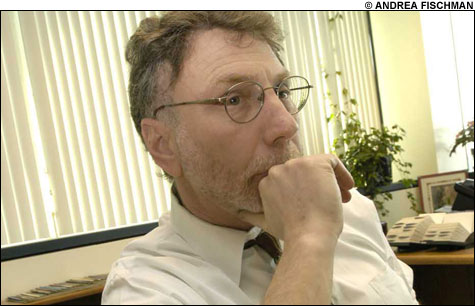
MEDIA BARON: Despite recent cutbacks, “This is a time for reinvention,” says the Globe editor. |
Earlier this week, in an e-mail to the Boston Globe newsroom, editor Marty Baron announced the imminent departure of three key employees: executive editor Helen Donovan, deputy managing editor for news operations Mike Larkin, and business columnist Steve Bailey, who’s written the “Downtown” column for nearly 10 years. (Given the recent push by the New York Times Company, the Globe’s corporate parent, to eliminate 60 Globe jobs via buyouts, it’s likely that each of the three is receiving some sort of severance package; whether they’re part of the current buyout framework is unclear.)
In that same e-mail, Baron also announced three promotions. Caleb Solomon, the paper’s front-page editor, will become managing editor for news; Ellen Clegg, the deputy managing editor/Sunday, will take Larkin’s old slot; and Mark Morrow, the paper’s deputy managing editor for projects, will become deputy managing editor for the Sunday paper, as well.
Taken in isolation, these departures certainly represent — as Baron said in his e-mail — “huge changes.” And with no disrespect intended toward Larkin, who seems to have performed admirably in a high-difficulty, low-glory job, the exits of Donovan and Bailey are probably the hugest.
Bailey’s importance should be evident to anyone who reads him regularly, or pays even passing attention to Boston business or politics. With his aggressive reporting, frequent scoops (which often become front-page news), and acid commentary — e.g., saddling Deval Patrick with the moniker “Governor Slots” — Bailey has earned a reputation as the most influential columnist in town. His replacement, whoever he or she is, will face exceedingly high expectations; the fact that Globe insiders struggle when asked to suggest possible candidates shows just how hard filling that job will be.
Donovan’s significance is more subtle. Given her lofty position in the Globe hierarchy — she’s been the second-ranking editor for 15 years, and under two editorial regimes — her public profile is remarkably low. This seems, in part, to be a function of her personality. Colleagues describe her as a reserved woman who rarely ventures out of her office. But it might also reflect the fact that Donovan’s array of responsibilities kept her tethered to her post on Morrissey Boulevard. Her administrative responsibilities, which included overseeing and brokering relations between the Globe’s various editorial departments, would be a full-time job by themselves. But Donovan also served as the last read for the front page, meticulously reviewing each story on A1 before the paper went to press.
While not everyone appreciated Donovan’s management style, most people who’ve worked with her say she’ll be greatly missed. “In what we do, attention to detail is everything — and I have never known an editor who paid more attention to details, both journalistic and administrative, than Helen Donovan,” says one. “She has a vacuum cleaner of a mind.”
“Of all the changes we’ve had in the last few years,” another colleague says of Donovan, “this one cuts closest to the bone.”
Wins and losses
As that latter comment suggests, though, this week’s developments really can’t be taken in isolation. The latest flurry of resignations and promotions needs, instead, to be viewed in the context of everything that’s happened since Baron became editor in July 2001.
On the one hand — and through no fault of Baron’s — the paper has lost a lot of jobs. (Two and a half years ago, for example, the Globe had 450 newsroom employees; once the latest round of job cuts is completed, that number will probably fall to around 375.) It’s also seen the departure of several major names. Metro editor Carolyn Ryan left for the New York Times; Pulitzer Prize–winning metro columnist Eileen McNamara took a buyout; so did Pulitzer-winning investigative reporter and editor Steve Kurkjian.
On the bright side, however, the Globe has won three Pulitzers in the Baron era, a pace that resembles the eight-year, four-Pulitzer run of his predecessor, Matt Storin. (A Globe series on global warming is reportedly a finalist in this year’s Explanatory Reporting category.) More to the point, Baron’s roster of signature hires and promotions continues to grow. He tapped Solomon as business editor, front-page editor, and now managing editor for news — which, it should be noted, is now the number-two spot on the Globe’s editorial totem pole. Baron also promoted former metro columnist Brian McGrory to metro editor, picked Doug Most to run the BostonGlobeMagazine, and put David Beard in charge of boston.com. He named Kevin Cullen and Yvonne Abraham as metro columnists. And he plucked Charlie Savage — who proceeded to win a Pulitzer for his influential series on presidential signing-statements — from the Miami Herald.
When Baron arrived in Boston, also from the Miami Herald, he took the reins of a paper where he’d never actually worked, in a city he didn’t really know. Six years later — thanks largely to repeated job cuts necessitated by the newspaper industry’s ongoing struggles — virtually every facet of the Globe bears Baron’s imprint. Now more than ever, it’s his paper. And his choices are going to determine whether it thrives or just survives.